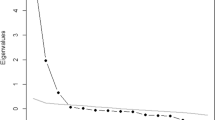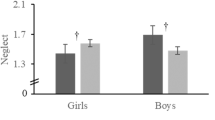Abstract
While the literature suggests that males are less emotionally expressive than females, the issue has been informed by little systematic research. This article investigates the differences between sons' and daughters' perceptions of their mothers' and fathers' expressiveness of several emotions, both verbally and nonverbally. Using a sample of 1,245 students the dependent variable, perceived expressiveness of parents, was determined from responses to a 16-item Likert-type Perceived Parental Expressiveness Scale (PPES). It was hypothesized that fathers would be perceived to be less expressive than mothers. T tests were used to determine whether the mean differences are significant. The data indicate that fathers are perceived as less expressive of all emotions except physical anger. The ramifications of these findings for sex-role learning are discussed.
Similar content being viewed by others
References
Aronoff, J., & Crano, W. D. A re-examination of the cross-cultural principles of task segregation and sex role differentiation in the family. American Sociological Review, 1975, 40(February), 12–20.
Balswick, J. O., & Peek, C. The inexpressive male and family relationships during early adulthood. Sociological Symposium, Spring 1970, pp. 1–12.
Bardwick, J. M., & Douvan, E. Ambivalence: The socialization of women. V. Gornick & B. K. Moran (Eds.), Woman in sexist society. New York: New American Library, 1971. Pp. 225–241.
Biller, H. B. Father, child and sex role. Lexington, Mass.: Heath Lexington Books, 1971.
Blumer, H. Symbolic interactionism: Perspective and method. Englewood Cliffs, N.J.: Prentice-Hall, 1969.
Chafetz, J. S. Masculine/feminine or human. Itasca, Ill.: F. E. Peacock Publishers, 1974.
Freeman, J. Growing up girlish. Transaction, 1970, 8, 36–43.
Hochschild, A. R. A review of sex role research. American Journal of Sociology, 1973, 78(4): 1011–1029.
Johnson, M., Stockard, J., Acker, J., & Naffziger, C. Expressiveness re-evaluated. Paper presented at the meeting of the American Sociological Association, Montreal, 1974.
Kohn, M. L., & Carroll, E. E. Social class and the allocation of parental responsibilities. Sociometry, 1960, 23, 372–392.
Lewis, M. Parents and children: Sex-role development. School Review 1972, 80(February), 229–240.
Millett, K. Sexual politics. New York: Doubleday, 1970.
Parsons, T., & Bales, R. F. Family, socialization and interaction process. Glencoe, Ill.: Free Press, 1955.
Turner, R. H. Family interaction. New York: Wiley, 1970.
Veroff, J., & Feld, S. Marriage and work in America. New York: Van Nostrand Reinhold, 1970.
Author information
Authors and Affiliations
Additional information
The research reported in this paper is part of National Institute of Mental Health Grant No. 22156-01, “The Inexpressive Male” (Jack Balswick, Principal Investigator), University of Georgia. The authors wish to thank Dr. Charles W. Peek for his assistance in the revision of this article.
Rights and permissions
About this article
Cite this article
Slevin, K.F., Balswick, J. Childrens' perceptions of parental expressiveness. Sex Roles 6, 293–299 (1980). https://doi.org/10.1007/BF00287350
Issue Date:
DOI: https://doi.org/10.1007/BF00287350




